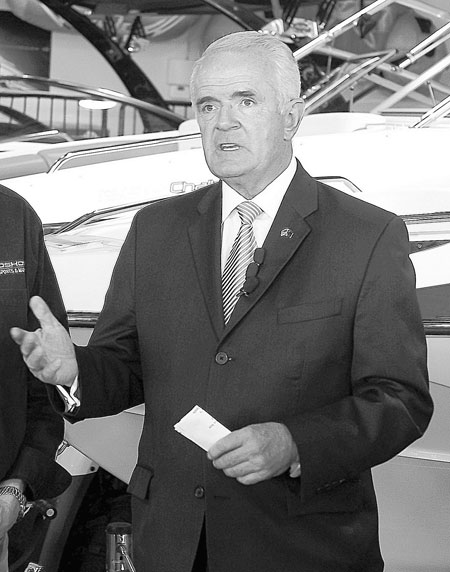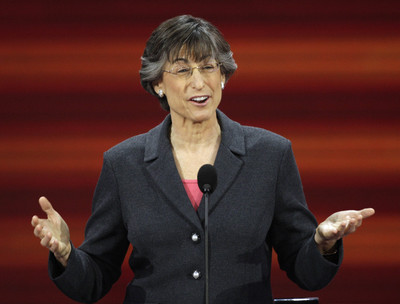Nevada is not alone — budget shortfalls force cuts, tax hikes in all but three states
CARSON CITY -- North Carolina Gov. Beverly Perdue infuriated state worker groups last month when she signed legislation cutting salaries for teachers and state employees by 0.5 percent.
That was her way of handling North Carolina's budget problems. Of course, each employee later this year can take a 10-hour paid furlough to help make up for the pay cut.
"We can only wish we had those problems," said Nevada Senate Taxation Committee Chairman Bob Coffin, D-Las Vegas.
Even if Nevada might be envious of North Carolina's relatively mild budget woes, the Silver State's pain is still being felt by the vast majority of states.
The Center on Budget and Policy Priorities, a group that monitors state spending, said in a report last month that 47 states face funding shortfalls that are expected to increase in the fiscal year that begins July 1 and continue into 2011.
Only Wyoming, Montana and North Dakota have been immune to the current recession.
Nevada's revenue shortfall has been calculated as the nation's largest in terms of percentage.
The state and its counterparts are struggling with very similar challenges -- where to raise taxes, where to make cuts -- and often are considering the same fixes. Increase sin taxes. Plug holes with stimulus funds. And across the board, pay cuts are a contentious issue.
Legislative budget committees in Nevada decided last week they had no choice but to decrease teacher pay by 4 percent because of the revenue gap now estimated at 44 percent, or upwards of $2.5 billion.
They also decided Nevada state employees will receive 12 unpaid furlough days, equivalent to a 4.6 percent pay cut.
The entire Legislature has yet to approve the cuts.
In Idaho, teacher salaries were cut by 2.6 percent and administrator pay by 5 percent. Legislation was approved to authorize school districts to reopen contracts with teacher unions and attempt to negotiate down benefits because of a financial emergency.
In Arizona, the Legislature has yet to decide whether to approve a plan to cut public education by 5 percent.
Nonetheless, in anticipation of the cut, the city of Tucson announced it will lay off 600 teachers next fall. The Phoenix suburb of Mesa plans to lay off 200 teachers.
Los Angeles teachers plan a strike this week to protest a $600 million cut by the local school board that will result in layoffs of 5,400 teachers.
And teacher pay has been cut by individual districts in Georgia, usually by about 2 percent.
In Oregon, Gov. Ted Kulongoski asked teachers work five days for free, or he would shorten the school year. School districts then found enough money to pay teachers for the full year.
Fourteen states already have increased taxes, said Nick Johnson, an analyst for the Center on Budget and Policy Priorities.
Twenty others are giving serious consideration to tax hikes.
Johnson's group found that states on average are covering 40 percent of their deficits by plugging in federal stimulus funds. Those funds will run out by 2011.
"Hopefully, the economy will rebound," said Johnson, whose organization analyzes how state and local programs affect low and moderate income people. "I don't want to think about what we will do if the economy doesn't improve."
Arturo Perez, an analyst with the National Conference of State Legislatures in Denver, said stimulus funds "obviously are a way to fill the hole, but they are gone in two years."
Nevada is expected to receive no more than $357 million in stimulus funds that can be applied to the general fund revenue shortfall, a fraction of the revenue gap.
Perez said another favorite way to cover budget shortfalls is to raise cigarette taxes. Three states raised such taxes in recent weeks, and he expects many more will by July 1.
Nevada now levies a per pack tax of 80 cents and has legislation pending that would add an extra buck to that amount.
Even at $1.80 a pack, the tax would be lower than that in New York, Alaska, Washington and many other states.
Nevada Gov. Jim Gibbons has threatened to veto any new taxes proposed by the Legislature.
He has a soulmate in fellow Republican Gov. Linda Lingle of Hawaii.
She vowed last week to veto $278 million in tax increases -- mainly cigarette and room tax proposals -- passed by the Democrat-dominated Legislature. The taxes would be used to offset state employee salary cuts.
But it's not only Republican governors who threaten to veto tax increases.
Ohio Gov. Ted Strickland, a Democrat, has vetoed bills to restrict tax credits on the grounds they're needed to help business during the current recession.
"I continue to believe that increasing taxes on Ohioans during this national economic downturn would deepen the effects of the recession in Ohio and hurt, rather than help, Ohio families striving to emerge from this recession," Strickland said in a recent message to the state auditor and Republican legislators.
In Nevada, legislators are likely to increase taxes by $1 billion or more within the next 18 days.
State Senate Majority Leader Steven Horsford, D-Las Vegas, said in a recent interview that budgets will be cut by more than $1 billion, but added there is a "shared responsibility" for the shortfall.
All taxes remain under consideration for increases, according to Coffin.
That includes cigarette, liquor and mining taxes. The state's current 0.63 percent modified business tax could be tripled, he added.
"A lot can be done in the next two weeks," Coffin said.
Contact reporter Ed Vogel at evogel@reviewjournal.com or 775-687-3901.
























